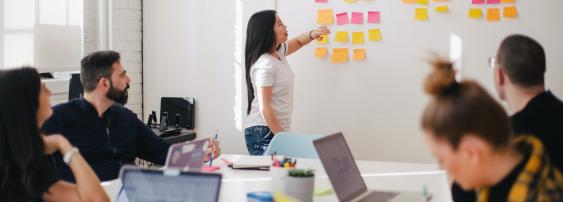How to get the most out of attending thought-leadership events: our 5 simple tips
We know thought-leadership events are a big deal (well, we would say that).
From learning and networking opportunities to finding industry-specific tools and tech – and even Insta-perfect content opps for your social channels – events have the power to make a real difference to your business. As long as they provide real value.
You know what we’re talking about. You turn up at an event, look at some cool stuff, hear people talk, and the next day, it’s like it never even happened. You had a nice time but did it help you solve your problems? Did you learn anything new? Did it benefit your role or your business as a whole? Too often, the answer is no.
So, how can you make sure you go home with more than a free pen and a bunch of business cards?
Here are 5 tips to help you get the most out of industry events…
1. Pick the right event
When it comes to events, careful selection is key. And this should always start with clear objectives.
What problem do you need to solve? It could be anything from a highly specific pain point right the way through to wanting to gain knowledge in a particular area or increase your brand’s visibility. Whatever it is, pin it down.
With so many events on the market, the only way to sort the beneficial type from the not-so-beneficial, is by defining what you need.
2. Plan ahead
When you’re attending an event it might feel like you can just turn up without any pre-planning – you’re an attendee, a guest – you’re just going to rock up and have a good time, right? Sounds great. The only downside is you might not end up getting what you came for.
Again, this comes back to your objectives. What do you want to get from the event? What information do you want to find out? What problems do you want to focus on? Is there someone specific you’d like to talk to?
If it sounds like a lot of hassle, don’t panic. Pre-planning for an event can be as simple as writing a couple of sentences that sum up what you want to address – or as complex as creating a five page document. Either way, a plan of some kind is better than no plan at all. You’ll turn up feeling confident, purposeful, and have a better chance of actually getting what you came for.
Are you a decision maker? If so, you can register for our virtual or in-person Masterclasses, free of charge. Click here to see all of our upcoming events.
3. Speak out
When it comes to knowledge-exchange events, the clue is in the title; they’re a forum for sharing ideas and information. If you have a question to ask or a topic you want to discuss, don’t be afraid to speak out. At our Masterclasses, we want to hear from you, we want you to be part of the conversation.
If the thought of speaking in front of people you don’t know makes you feel uncomfortable, you’re not alone. Public speaking – even when it’s in front of a small group – is daunting for most people. Our previous point about planning can help with this.
When you know in advance what you want to discuss, it’s easier to formulate a question or topic suggestion. And remember, it’s beneficial for everyone. If you have a challenge, the chances are other people will know exactly what you're talking about. When you share, you get the benefit of everyone’s insights – and the opportunity to spark conversations and connections with your peers.
4. Log as you go
Knowledge-based events involve a lot of talking, a lot of ideas, and a lot of information. It can all get a bit blurry. You might think you’re going to remember all the things you’ve heard, but guess what? You won’t. Unless you write them down.
Taking notes as you go is the best way to retain the information you’re receiving. But how you take notes is important; there’s no point writing things down if they don’t make sense a week later.
Cal Newport’s book “How to Become a Straight A Student”, is aimed at students but his advice on note taking is relevant to everyone: steer clear of writing down individual ideas or raw information. Instead, he recommends using a ‘Question, Evidence, Conclusion’ format. Apart from being a quicker way of taking notes, it’s crucially a more effective way of keeping the meaning clear and concise.
5. Keep it social
Now that in-person events are back (hooray!), don’t forget to take full advantage of social and networking opportunities. In a post-pandemic world it’s all too easy to have the Zoom ‘get in and get out’ mindset – but you might miss out on making worthwhile connections.
If there’s a pre-event breakfast, a post event lunch or happy hour, stay and chat to your peers. This is something you can only do at in-person events – and you never know who you could meet…
One of the easiest ways to make the most of events is by leveraging your content opportunities. Taking pictures of the event space, the keynote presentations – or just smiley selfies with your peers – all make perfect material for your social channels. It’s low effort, free, and a great way to boost your brand image and engagement.
You could take a 20 second video and upload it to Linkedin or Twitter, tagging the speaker or the event team, and voila! Instantly shareable, likeable social content. And as other attendees will be browsing the event hashtag, it’ll help you connect and network post-event.
Want to find out more about our Masterclasses? We’d love to hear from you. Click here to see our full list of global events.


